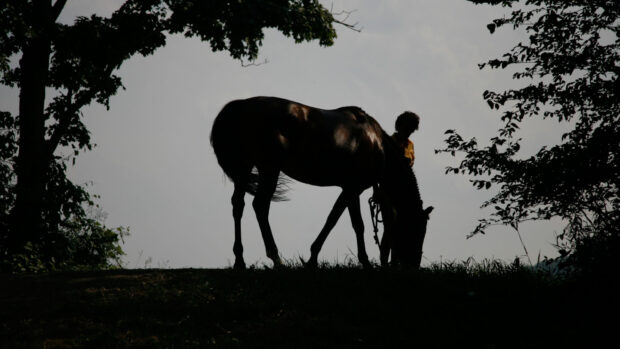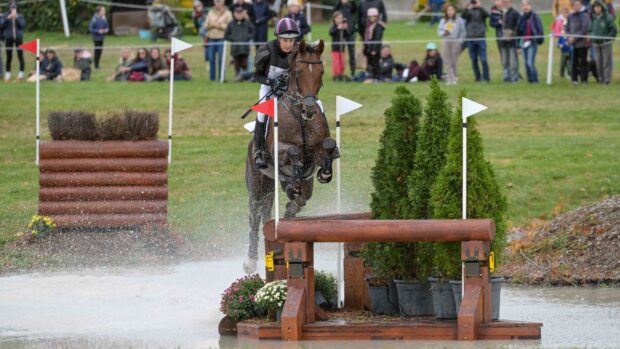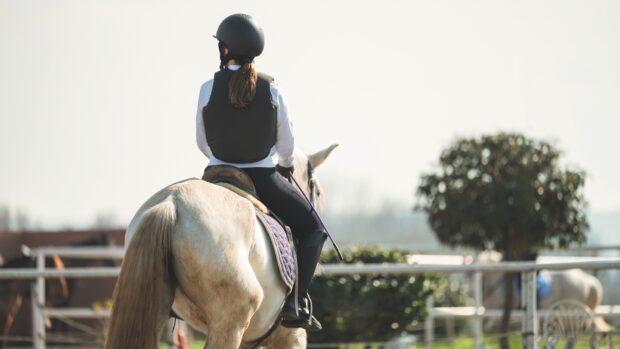Electroacupuncture is a “viable treatment option” for horses suffering from headshaking, research has found – as nearly two-thirds of those treated showed improvement.
A study carried out by a team at the Royal Veterinary College (RVC) found the technique had “good success” in treating equine trigeminal nerve-mediated headshaking.
TMHS causes uncontrollable, involuntary flicking and shaking of the head; it can be very painful and distressing for horses and mean sufferers are unrideable; in some of the most extreme cases, it can mean euthanasia.
“Although the exact cause has not yet been identified, it is presumed that the trigeminal nerve in affected horses reacts excessively to external stimulation,” an RVC spokesperson said. “Currently, there is no cure for the condition. However, electroacupuncture, which is the use of needles and an electric current to change the pain perception in the nerve, has been successful in treating TMHS in a small number of cases, but results from a more substantial number of cases have not yet been assessed.”
The RVC team, led by Bettina Dunkel, head of equine and professor of equine internal medicine, emergency and critical care, and with four external collaborators, retrospectively assessed electroacupuncture’s effectiveness in 42 horses treated with the technique between 2015 and 2024.
Data assessed included the horses’ history, duration and severity of TMHS, diagnostic tests, number of electroacupuncture treatments and the effect of treatment as perceived by the owner or main vet.
“The findings showed that the procedure was well tolerated by all horses and achieved a significant improvement in headshaking, with the median grade before treatment at three and after treatment at one,” the spokesperson said.
“Overall, 64% of cases showed an improvement in TMHS after their final treatment, with complete resolution of signs seen in 33% of horses. No improvement was seen in 31% of cases and two horses (4.8%) experienced worsening of clinical signs post-treatment.”
The team concluded that electroacupuncture was well tolerated with minimal complications and improvement in most horses. The advantages of the treatment include the fact it has a low complication rate and can be carried out in the yard.
Professor Dunkel said: “Electroacupuncture is a viable treatment option for horses suffering from this devastating disease. We are very pleased with the results of the study and hope that it will encourage veterinarians and horse owners to pursue this treatment option.”
Refining the technique
The team suggested that refinement of the technique over time, such as changing the duration of the treatment or electrical frequencies, could help increase the success rate and create longer remission periods.
Equine vet Sue Devereux, the author of the first study in this area in 2017 (vet clinic, 2 June 2022), told H&H the treatment is a major step forward as apart from the use of nose nets and masks, “which I wholeheartedly recommend”, the condition is so hard to manage.
“The results of this study with a larger number of horses are very encouraging as they are consistent with the earlier findings and confirm that electroacupuncture is a worthwhile treatment option for TMHS,” she said. “It is important that other possible causes of head shaking are always ruled out first.”
Ms Devereux said she was inspired to use the treatment on more horses by a dressage mare called Izzy who had been “tormented” by TMHS and had been unrideable in spring and summer for three years.
“She responded remarkably well, remaining free of signs for longer than we had dared hope and was able to compete all year round,” she said. “This encouraged me to treat other cases.”
She added that although factors such as pollen, sunlight, wind and rain can trigger headshaking, it is still not known what causes the effect on the nerve.
“If only we could establish the causes of this painful condition, then we would be closer to finding a cure,” she said.
- To stay up to date with all the breaking news from major shows throughout 2025, subscribe to the Horse & Hound website
You may also be interested in:

Head-shaking horse faced being put down: owner speaks out on whisker-trimming

Nose nets to suit all styles of bridle

Headshaking in horses: what you need to know about this distressing condition




